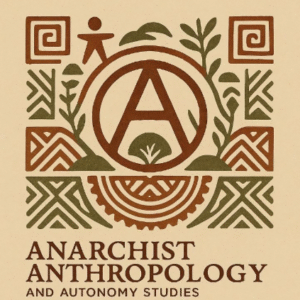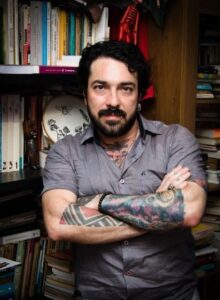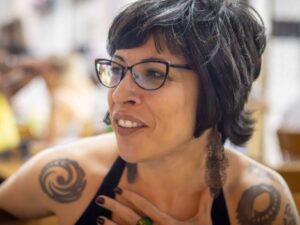The IUAES Commission on Anarchist Anthropology and Autonomy Studies was approved in February 2025.
 The Comission is envisioned as a space for critical engagement at the intersection of anarchist theory and anthropological practice. It aims to convene scholars, activists, and researchers who are rethinking the foundations of social organization beyond hierarchical and centralized structures. Through a transdisciplinary approach, the Commission interrogates how communities enact forms of autonomy, solidarity, and resistance that challenge dominant paradigms of governance and power. By drawing from diverse experiences and contexts, the Commission examines how anarchist anthropology can serve as both a theoretical lens and a practical tool for imagining alternative modes of collective life.
The Comission is envisioned as a space for critical engagement at the intersection of anarchist theory and anthropological practice. It aims to convene scholars, activists, and researchers who are rethinking the foundations of social organization beyond hierarchical and centralized structures. Through a transdisciplinary approach, the Commission interrogates how communities enact forms of autonomy, solidarity, and resistance that challenge dominant paradigms of governance and power. By drawing from diverse experiences and contexts, the Commission examines how anarchist anthropology can serve as both a theoretical lens and a practical tool for imagining alternative modes of collective life.
The need for such a Commission arose from a growing recognition that dominant state-centred frameworks of social science are limited in accounting for the richness and complexity of human organization outside the state. Anthropological work inspired by figures such as Pierre Clastres, James C. Scott, David Graeber, Harold Barclay, and Eduardo Viveiros de Castro has shown how stateless societies, indigenous cosmologies, and everyday forms of resistance can disrupt entrenched narratives of authority and progress. This Commission responds to a call for methodologies and theories that engage seriously with mutual aid, reciprocity, and horizontal decision-making practices. In doing so, it invites reflection on how anthropological knowledge can be produced through non-hierarchical, collaborative, and ethically grounded means.
The Commission addresses urgent social and political questions, including how communities resist domination and cultivate forms of life rooted in autonomy and care. The members examine how anarchist anthropology addresses contemporary crises of inequality, alienation, and ecological devastation by exploring informal networks of resistance, gift economies, critiques of neoliberalism, and the possibilities of prefigurative politics. Special attention is given to the contributions of subaltern and indigenous movements, as well as post-colonial and anti-colonial perspectives, which challenge extractivist and capitalist logic. Through ethnographic, historical, and archaeological inquiries, the Commission on Anarchist Anthropology and Autonomy Studies underscores the relevance of anarchist thought in shaping socially just futures.
Dr. Cássio Brancaleone
Chair and Founder of the Commission
 Cassio Brancaleone is an anthropologist and sociologist dedicated to the study of social movements and the autonomous processes of self-organization among subaltern groups. His research centers on practices of self-management, self-governance, and the construction of collective autonomy. Grounded in an anti-colonial and anarchist epistemology, his work seeks to understand and support experiences where communities organize themselves beyond the state and capitalist frameworks.
Cassio Brancaleone is an anthropologist and sociologist dedicated to the study of social movements and the autonomous processes of self-organization among subaltern groups. His research centers on practices of self-management, self-governance, and the construction of collective autonomy. Grounded in an anti-colonial and anarchist epistemology, his work seeks to understand and support experiences where communities organize themselves beyond the state and capitalist frameworks.
In 2008, he carried out a year-long ethnographic fieldwork among zapatista communities in Chiapas, Mexico, actively participating in both research and grassroots activism. During this period, he documented the institutions, everyday practices, and political architectures that sustain zapatista self-government, focusing on the creation of the Caracoles and the Juntas de Buen Gobierno as radical experiments in autonomy. This experience not only enriched his theoretical perspective but also integrated him into a wider Latin American network of activist-scholars committed to struggles for emancipation and grassroots self-determination. His work seeks to highlighting how communities create and sustain alternative social orders that challenge the colonial-state-capitalist logic and offer radical experiments in dignified living.
PhD in Sociology from the Institute of Social and Political Studies (IESP) at the State University of Rio de Janeiro (UERJ). He completed postdoctoral studies at the University of Buenos Aires (UBA) and the University of São Paulo (USP). For the past 14 years, he has been engaged in teaching, research, and outreach as a faculty member at the Federal University of the Southern Frontier (UFFS), Brazil. He is a founding member of the UFFS faculty union (SINDUFFS), and a founder and member of the Working Group on Anticapitalisms and Emerging Sociabilities (ACySE) of the Latin American Council of Social Sciences (CLACSO). He served as editor of Revista Gavagai, the journal of the Interdisciplinary Graduate Program in Human Sciences (PPGICH) at UFFS. He is the author of the books Teoria Social, democracia e autonomia: uma interpretação da experiência zapatista de autogoverno (Brazil Publishing, 2019), Anarquia é ordem: reflexões contemporâneas sobre teoria política e anarquismo (Brazil Publishing, 2020), Giovanni Rossi: semeador de utopias (Humana, 2023), and Alebrijes anárquicos. Anarquismo, praxis anticolonial y autonomía en América Latina – co-authored with researcher Gaya Makaran (Bajo Tierra/Eleuterio/Editora da UFFS, 2024).
Dr. Elizabete R. Albernaz
Co-Chair
 Dr. Albernaz is an anthropologist researching the state from an anarchist perspective. She is a Research Associate at the University of the Witwatersrand (WITS) in Johannesburg, South Africa, and the Vice-Coordinator of the Laboratory of Studies on Conflict, Citizenship, and Public Security (LAESP/UFF) in Niterói, Brazil.
Dr. Albernaz is an anthropologist researching the state from an anarchist perspective. She is a Research Associate at the University of the Witwatersrand (WITS) in Johannesburg, South Africa, and the Vice-Coordinator of the Laboratory of Studies on Conflict, Citizenship, and Public Security (LAESP/UFF) in Niterói, Brazil.
Her work aims to problematize the liberal division between state, society, and market by adopting a marginal perspective on the state, as produced by forms of “anti-state” inhabiting the interstices of statal forms. In her Master’s research, Dr. Albernaz studied the evangelical movement within the Military Police of Rio de Janeiro, exploring the role of religious forms in the everyday operation of police bureaucracies. In her PhD, she used the idea of a multi-sited ethnography to connect her fieldwork in police work environments and the everyday life of a “favela” (slum) in Rio de Janeiro’s peri-urban area, revealing how a political economy of “police productivity”, based in militarized and exploitative forms of police work, produce the margins of the state and the state itself as a marginal form in Brazil. Dr. Albernaz’s postdoctoral work focused on the activities of police unions, associations, and political movements, examining representations of police work and the political implications of identifying officers as workers in Brazil and South Africa.
Currently, Dr. Albernaz researches urban struggles, grassroots urban movements, and autonomous forms of self-organization in their relationship with the state, especially with the courts and the police, in post-apartheid South Africa. Her fieldwork is centred on building occupations in Johannesburg’s inner city, where residents reclaim abandoned structures and govern them through popular committees. These committees operate on the principles of mutual aid, collective decision-making, and resistance to state and market-driven exclusion resulting from urban development projects.
Through immersive ethnographic research, Dr. Albernaz examines how these committees function as spaces of everyday resistance and experiments in non-hierarchical governance. She documents how residents manage conflict, share resources, and develop strategies for survival and solidarity in the building committees, responding to a hostile neoliberal urban landscape. Her work highlights the capacity of these communities to create and sustain alternative forms of social organisation that challenge dominant paradigms of authority and express powerful autonomy and collective hope in the face of systemic inequality.


